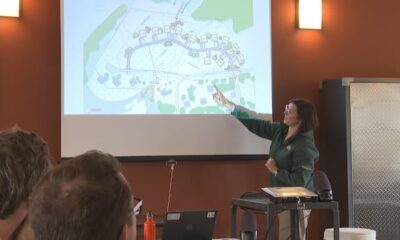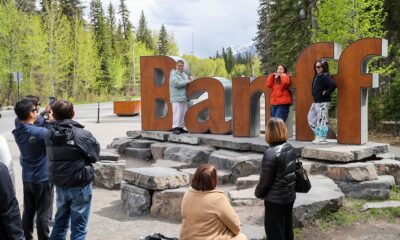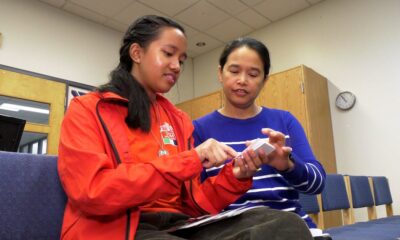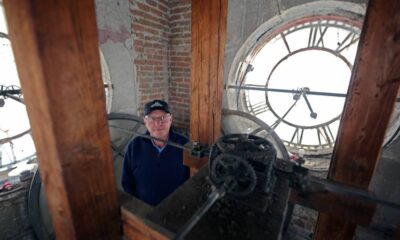Top Stories
Historic Honor for Kanien’kehá:ka Nurse Edith Anderson Monture
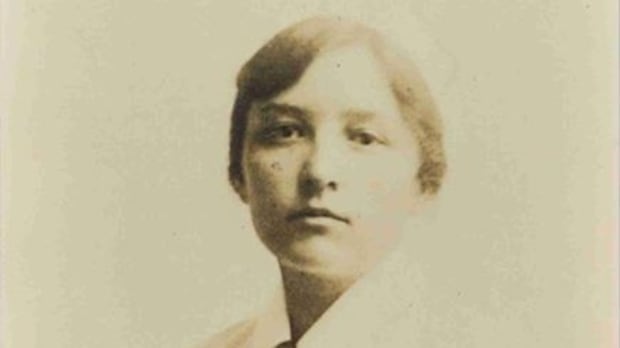
UPDATE: Kanien’kehá:ka nurse Edith Anderson Monture has just been designated a national historic person by Parks Canada, a recognition that highlights her groundbreaking contributions nearly 30 years after her passing. This announcement, made public today, underscores the significant impact Monture had on healthcare and Indigenous rights in Canada.
Born in Ontario to the Kanien’kehá:ka community of Six Nations of the Grand River, Monture was one of the first First Nations women to earn a nursing degree in Canada. She faced immense challenges, including systemic racism that forced her to seek education in the United States. After receiving her diploma in 1914, she served during the First World War, providing care for wounded soldiers in France.
Her grandson, John Moses, who is also of Kanien’kehá:ka heritage, played a pivotal role in her nomination, aiming to inspire Indigenous youth in healthcare. “My main motivation was hopefully this will serve as an incentive for other young Indigenous people out there who are looking for role models within the health-care professions,” Moses said in a recent statement.
Monture’s achievements were not without struggle. She was denied entry to Canadian nursing schools that predominantly admitted white students, and pursuing her education in the U.S. risked her Indian status due to the Indian Act. Her story reflects the systemic barriers faced by Indigenous peoples in Canada, as noted by historian Erin Millions, who co-nominated Monture. “Her exclusion from Canadian nurse training programs highlights the racism and colonial policies that often prevented First Nations students from accessing post-secondary education,” Millions stated.
Minister of Canadian Identity and Culture Steven Guilbeault emphasized the importance of honoring diverse histories in a press release. “Historic designations play a vital role in preserving Canada’s shared heritage and identity,” Guilbeault said. “They ensure that the stories of the people, places, and events that have shaped our nation are remembered.”
Monture, who lived to be 105 years old, also made significant contributions as a midwife and an advocate for First Nations voting rights. Her legacy serves as a reminder of the resilience and strength of Indigenous women.
As Canada reflects on this historic designation, the focus shifts to the broader implications of Monture’s life and the ongoing challenges faced by Indigenous communities today. The recognition is not only about honoring her achievements but also about acknowledging the systemic issues that necessitated her journey.
This designation comes alongside other recent recognitions, including the acknowledgment of Mary Two-Axe Earley, another notable Kanien’kehá:ka figure who fought against gender discrimination in the Indian Act. These developments signify a growing recognition of the vital roles Indigenous individuals have played in shaping Canada’s history.
As this story continues to unfold, it highlights the urgent need for discussions around Indigenous rights, representation in healthcare, and the importance of historical recognition. The impact of Edith Anderson Monture’s legacy is felt not just in history but in the present, inspiring future generations to strive for equality and representation.
-

 World4 months ago
World4 months agoScientists Unearth Ancient Antarctic Ice to Unlock Climate Secrets
-

 Entertainment4 months ago
Entertainment4 months agoTrump and McCormick to Announce $70 Billion Energy Investments
-

 Lifestyle4 months ago
Lifestyle4 months agoTransLink Launches Food Truck Program to Boost Revenue in Vancouver
-

 Science4 months ago
Science4 months agoFour Astronauts Return to Earth After International Space Station Mission
-

 Technology2 months ago
Technology2 months agoApple Notes Enhances Functionality with Markdown Support in macOS 26
-

 Top Stories3 weeks ago
Top Stories3 weeks agoUrgent Update: Fatal Crash on Highway 99 Claims Life of Pitt Meadows Man
-

 Sports4 months ago
Sports4 months agoSearch Underway for Missing Hunter Amid Hokkaido Bear Emergency
-

 Politics3 months ago
Politics3 months agoUkrainian Tennis Star Elina Svitolina Faces Death Threats Online
-

 Politics4 months ago
Politics4 months agoCarney Engages First Nations Leaders at Development Law Summit
-

 Technology4 months ago
Technology4 months agoFrosthaven Launches Early Access on July 31, 2025
-

 Top Stories2 weeks ago
Top Stories2 weeks agoFamily Remembers Beverley Rowbotham 25 Years After Murder
-

 Top Stories4 days ago
Top Stories4 days agoBlake Snell’s Frustration Ignites Toronto Blue Jays Fan Fury

